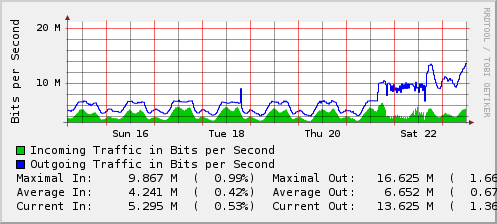Nginx to Apache?
Sunday, May 23rd, 2010A few months ago we had a client that wanted to run Nginx/FastCGI rather than Apache because it was known to be faster. While we’ve had extensive experience performance tuning various webserver combinations, the workload proposed would really have been better served with Apache. While we inherited this problem from another hosting company — he moved because they couldn’t fix the performance issues — he maintained that Nginx/FastCGI for PHP was the fastest because of all of the benchmarks that had been run on the internet.
While the conversion to or from one server to another is usually painful, much of the pain can be avoided by running Apache on an alternate port, testing, then, swapping the configuration around. The graph below shows when we changed from Nginx to Apache:

We made the conversion from Nginx to Apache on Friday. Once we made the conversion, there were issues with the machine which was running an older kernel. After reviewing the workload, we migrated from 2.6.31.1 with the Anticipatory Scheduler to 2.6.34 with the Deadline Scheduler. Three other machines had been running 2.6.33.1 with the CFQ scheduler and showed no issues at the 10mb/sec mark, but, we felt that we might benchmark his workload using deadline. We’ve run a number of high-end webservers with both Anticipatory and CFQ prior to 2.6.33 and for most of our workloads, Anticipatory seemed to win. With 2.6.33, Anticipatory was removed, leaving NOOP, CFQ and Deadline. While we have a few MySQL servers running Deadline, this is probably the first heavy-use webserver that we’ve moved from CFQ/AS to Deadline.

The dips in the daily graph were during times where a cron job was running. The two final dips were during the kernel installation.
All in all, the conversion went well. The machine never really appeared to be slow, but, it is obvious that it is now handling more traffic. The load averages are roughly the same as they were before. CPU utilization is roughly the same, but, more importantly, Disk I/O is about half what it was and System now hovers around 3-4%. During the hourly cron job, the machine is not having issues like it was before.
Nginx isn’t always the best solution. In this case, 100% of the traffic is serving an 8k-21k php script to each visitor. Static content is served from another machine running Nginx.
While I do like Nginx, it is always best to use the right tool for the job. In this case, Apache happened to be the right tool.